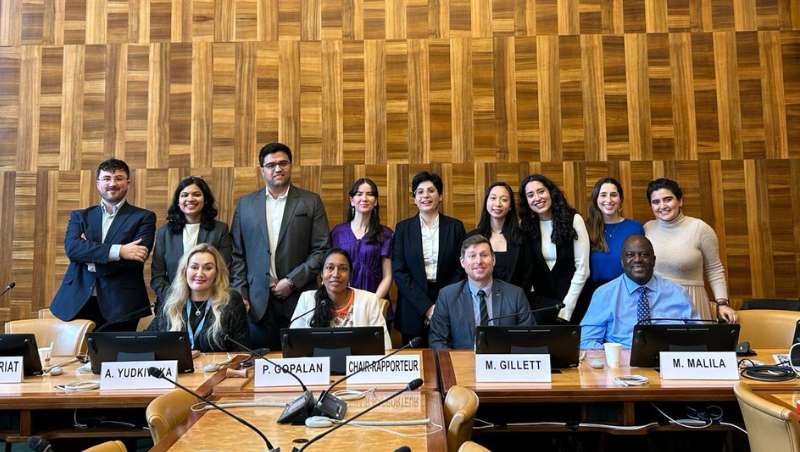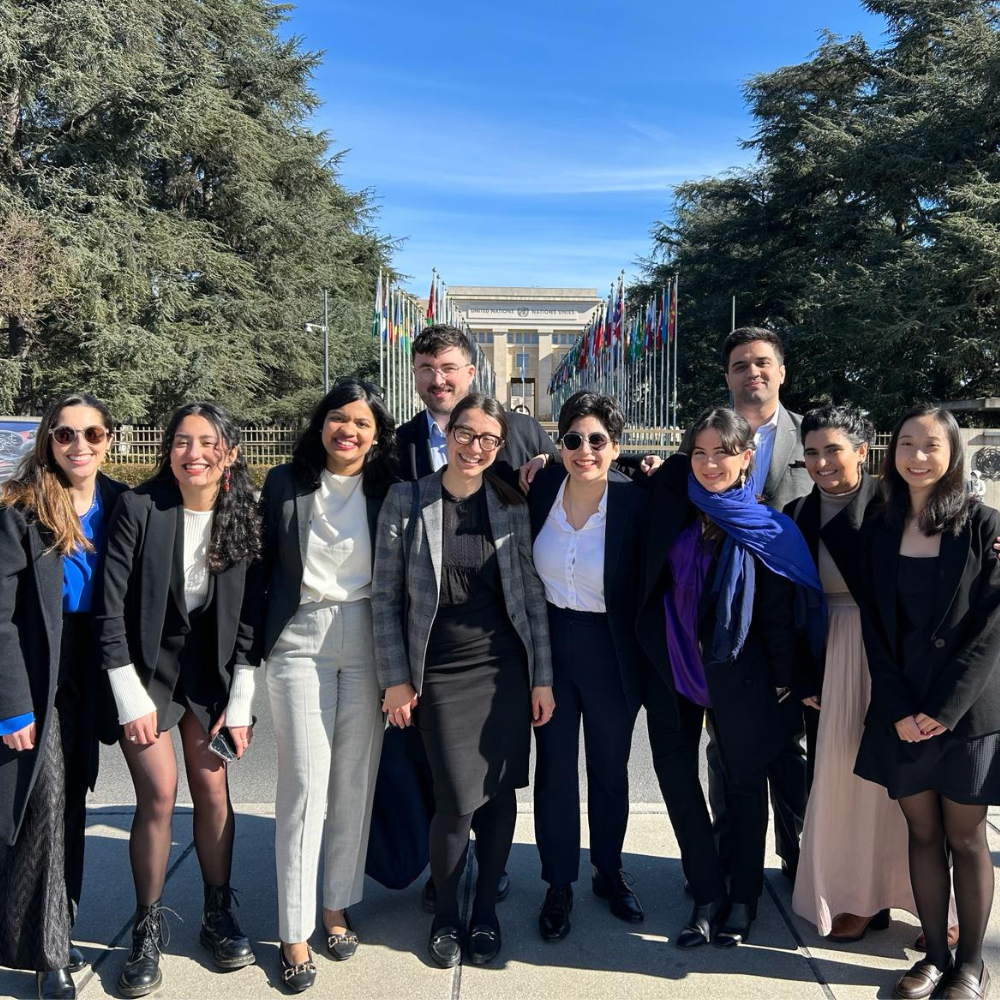Student members of Essex’s Arbitrary Detention Redress Unit (ADRU) joined supervisors Dr Matthew Gillett and Dr Sabina Garahan on a special visit to the United Nations in Geneva.
The visit was designed to provide contextual understanding of the United Nations human rights work, and opportunities to meet with professionals and experts on human rights, thanks to support of the Essex Human Rights Centre.
The students were also accompanied by Kavita D, Mohanty, a research assistant working with Dr. Gillet and Dr. Garahan on a report on migration related fact-finding issues.
The visit coincided with the Spring session of the 99th UN Working Group on Arbitrary Detention and the 55th session of the Human Rights Council.
On the first day, the students met with an officer of the team of the Special Rapporteur on the rights of Indigenous Peoples, who was also an Essex Law School human rights alumnus.
During this meeting, the students got an insight into the work of the mandate, a recent country visit the Special Rapporteur had conducted, and the activities and role of Special Procedures within the wider UN human rights system.
In addition, the students discussed the arbitrary detention of environmental human rights defenders and had the opportunity to share their key research findings and discuss how indigenous communities could be affected by this issue.
In the afternoon, the students had the opportunity to meet with three of the Working Group’s members, in addition to Dr Gillett:
- Dr Ganna Yudkivska
- Ms Priya Gopalan
- Dr. Mumba Malila
During the meeting with the Working Group, the students shared the key findings of their research.
The presentations were followed by an exchange with the Working Group’s members who shared insightful reflections on the topics presented by the students.
The discussion touched upon issues such as the importance of maintaining contact with civil society to improve understanding of field situations and exploring various and different perspectives when working on a case.
They also shared advice with the students on how to continue with their professional path into the UN System.
Additionally, the students had a meeting with the UN OHCHR Secretariat of Working Group.
The team of the Secretariat shared their professional experience and some useful recommendations on how to initiate a career path in the UN System.
The second day started with the students attending a meeting with the team of the Independent Investigative Mechanism for Myanmar (IIMM) who gave an extraordinary presentation about how the Mechanism works, the tools they have and the complex challenges they constantly face.
The team highlighted the importance of the victims’ approach and shared some insightful considerations relating to it, such as consent, confidentiality and clarity of the expectations.

The team of the IIMM also opened a space for students to ask questions about the mechanism, creating a unique opportunity to learn from their valuable experience.
Beyond the academic experience, the team appreciated the inspiring words such as ‘do not put the rocks on ourselves’ when discussing career paths.
To conclude this great visit, the students had the opportunity to attend to a meeting with 6 members of the team of the United Nations High Commissioner for Refugees.
During this meeting the students, Dr. Gillett, Dr. Garahan and Kavita Mohanty shared their progress in the project related to arbitrary detention, migration and fact finding.
After presenting, the UNHCR team gave very relevant feedback to continue the research.
This was an opportunity for the students not only to have captivating meetings and discussions with relevant human rights experts in different areas – rights of indigenous people, arbitrary detention, the conflict in Myanmar and refugees – but also an opportunity to see the Palais des Nations, take in the Geneva scenery, and spend time together in the evenings.
The ADRU is a project of the Human Rights Centre Clinic, which is open to all undergraduate and postgraduate students at the University of Essex.
During the last months the team members have been working on real cases of arbitrary detention and preparing thematic research and country-studies relating to immigration detention, fact-finding and detention of environmental human rights defenders.
The ADRU project will continue and new students will have other opportunities to live this great professional and personal experience, that creates connections and learnings outside the classroom.
The Arbitrary Detention Redress Unit (ADRU) student-members taking part in the visit were:
- Maria Fernanda Orozco Naranjo
- Martha Lewis
- Valeria Martínez Garcia
- Thi Ly Ly Nguyen
- Daniel Oliver Phibbs Jones
-
Virginia Carnabuci
- Natalia Montes de Oca Gatica
- Mohammad Natiq Malikzada


